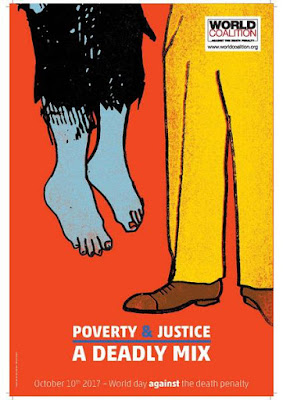October 10 marks World Day Against the Death Penalty, a time where human rights activist come together to advocate against capital punishment.
In the United States, executions occur so frequently that I bet a lot of Americans don't even realize how atypical this form of punishment is, particularly amongst other developed nations.
As Amnesty International points out, with fewer than 200 countries in the world, 141 of them don't use the death penalty, with 104 countries explicitly banning it.
In honor of World Day Against the Death Penalty, let's look at how just a few of those nations from various parts of the world officially got rid of the death penalty:
1. Australia
Originally settled as a penal colony, Australia has strong roots tied to punishment - and that included capital punishment. Gradually over a period of decades, however, Australian states and territories opted to get rid of the death penalty on their own accord, starting with Queensland in 1922 and wrapping up with New South Wales in 1985.
Not that there was a lot of clamor to bring the death penalty back, but in 2010, the Australian federal parliament decided to follow all of its states' lead and pass a law forbidding any part of Australia from reintroducing capital punishment down the road. It served as a recommitment to the idea that he death penalty is wrong.
2. Rwanda
After 800,000 people were killed in acts of genocide in the country, many of those responsible for these atrocities fled Rwanda to avoid punishment. Other countries kept tabs on these criminals on Rwanda's behalf, but refused to extradite them because of their own laws, which forbid them from turning over someone who would likely be charged with the death penalty.
If Rwanda wanted to get these murderers back, realistically, the country would have to choose to get rid of the death penalty.
It wasn't necessarily an easy decision for Rwandans since many survivors of genocide wanted to see the perpetrators of violence killed for their crimes. Ultimately, however, political leaders decided that achieving some sort of justice was preferable to letting these people go free and they voted overwhelmingly to end the death penalty.
3. Argentina
Argentina is an interesting case because its Constitution outlawed the death penalty at the time of its founding, only to see it reemerge a handful of times anyway. 5 times over the span of decades, Argentina decided to reinstate capital punishment, generally for just a couple years before opting to get rid of it again.
By 1984, his fickleness settled down and Argentina settled on only applying the death penalty for certain military-related matters. Then in 2008, Argentina decided even military personnel should be spared this fate. Like most of Latin America, it definitively eliminated the death penalty for everybody once and for all.
4. Vatican City
In 1929, Vatican City decided to follow Italy's lead and allow the death penalty.
That said, the tiny Catholic country was only prepared to use capital punishment for one crime and one crime only - the attempted assassination of the pope. (To be fair, that does seem like a pretty big one.)
Luckily for the popes, the death penalty was never necessary.
40 years later, it hadn't been used at all, and by then Catholic leaders decided it wouldn't want to use it even if there were an attempt on the pope's life.
To this day, the Vatican City has been outspoken on the issue of the death penalty.
Pope Francis has urged all countries in the world to get rid of this form of punishment permanently.
5. Mongolia
Only a decade ago, Mongolia was one of the Asian countries called out by human rights groups for conducting executions in secret, leaving it impossible to know how many people the government was killing.
All that changed in 2009, though, when Tsakhia Elbegdorj was elected president of Mongolia. A passionate death penalty abolitionist, he managed to singlehandedly change the course of the country by pledging to pardon all prisoners awaiting capital punishment in Mongolia. The following year, he put a moratorium on executions altogether.
At the time, pundits thought the moratorium was not likely to last past Elbegdorj's time in office, but that no longer seems to be the case. By 2015, the country's lawmakers came to see the president's point of view and officially abolished the death penalty.
Source: care2.com, October 10, 2017
⚑ | Report an error, an omission, a typo; suggest a story or a new angle to an existing story; submit a piece, a comment; recommend a resource; contact the webmaster, contact us:
deathpenaltynews@gmail.com.
Opposed to Capital Punishment? Help us keep this blog up and running! DONATE!
"One is absolutely sickened, not by the crimes that the wicked have committed,
but by the punishments that the good have inflicted." -- Oscar Wilde













